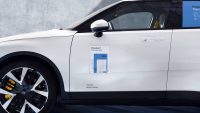Car dealers may have to get used to customers wanting to pay for cars using Bitcoin in the future as the crypto currency grows in popularity.
Tesla boss Elon Musk this week revealed the electric car manufacturer has invested $1.5bn in Bitcoin and said his firm would be happy to accept payment for its cars using the currency.
Bitcoin values have risen 300 per cent since October and hit a new high of $48,000 this week.
The price surged by as much as 20 per cent in January after Musk added ‘#Bitcoin’ to his Twitter profile biography.
Bitcoin is based on computer code and has no physical form. It was launched in 2009 and its aim was to decentralise currency out of reach of governments and financial institutions.
Supercar specialist Tom Hartley revealed he sold a Rolls-Royce which was paid for by the customer with Bitcoin, but he isn’t keen on accepting it.
He told Car Dealer: ‘We sold a Rolls Royce about 18 months ago and the client paid with Bitcon, but it’s not something that we welcome, or encourage. We didn’t hold on to it so we got what we needed from the deal.
‘It’s young money and I like real money. It’s too unpredictable for us and I don’t see it as a safe currency.
‘But it might be something we have to change in the future. It’s growing in popularity and our customers hold it, but we’d rather be paid in real money.’
Mike Jones, chairman of ASE Global and compiler of the Car Dealer Top 100 list of most profitable dealers in the UK, said the problem with Bitcoin was its volatility.
He said: ‘When dealers sell a car, they want to be certain on the value they will realise and, while recently there have been huge gains in Bitcoin, we have seen in the past that the currency can also be the focus of large falls.
‘The inherent problem with retailers accepting Bitcoin is the volatility of the currency.
‘This is fine if your income and costs are all in the same currency, however if you are earning in one currency and spending in another, then this volatility is important.’
Jones said that until Bitcoin became ‘more stable’ and widely accepted he thinks dealers will find it difficult to let customers pay for cars using it.
He added: ‘One solution for retailers may be to find someone to “underwrite” the value of the bitcoin receipt, in the same way as they would do with a trade-in vehicle they had no desire to sell themselves.
‘That may well be the bridge between the current scenario where limited numbers of customers want to use bitcoin for purchases, and any future widespread use.’
Supercar dealer Tom Jaconelli, owner of Romans International, told Car Dealer that his firm looked into accepting the currency a few years ago.
He said: ‘We do get a few customers asking us to pay for supercars in Bitcoin, but we were advised by our accountants at the time that it is too volatile.
‘The reality is I think it is unlikely that by refusing to accept Bitcoin that you are going to miss out on a sale.
‘Going forward, though, as Bitcoin becomes more and more mainstream and especially if other manufacturers and corporations follow Tesla’s lead then I think it will become a very viable option to be accepting Bitcoin as payment.’
Jaconelli said he will be looking at how his supercar dealership can make sure it is a ‘secure payment method’ and protect the business from its volatility.
Franchised car dealers were less likely to accept the payment and told Car Dealer they weren’t considering accepting it any time soon.
Marshall Motor Group CEO Daksh Gupta said accepting Bitcoin wasn’t in his plans and didn’t think it would be soon, while Hendy Group CEO Paul Hendy said he didn’t know enough about it to accept it.
‘I wouldn’t be encouraging us to accept it until I know more about it and have received the right advice,’ he told Car Dealer.
Umesh Samani, chairman of the Independent Motor Dealers Association, added: ‘Personally I wouldn’t take Bitcoin as payment, I have no ideas on values and fluctuations.
‘With pounds at least I know its true value and will be able to trade with anyone. In all honesty I’ve never been asked if I would take it as payment – maybe I simply don’t attract the customers who may deal in bitcoin.’
Tesla, the world’s most valuable car maker at $800m, said in a regulatory filing on Monday that it had bought Bitcoin to ‘diversify and maximise returns on our cash that is not required to maintain adequate operating liquidity’.
Banking experts have warned of the dangers of Bitcoin and similar cryptocurrencies. Agustín Carstens, president of the Swiss-based BI, compared it to a ‘community of online gamers, exchanging real money for items that only exist in cyberspace’.
What is Bitcoin?
Bitcoin is an entirely virtual currency that works without the need for a central bank, and can be sent over the internet. Coins are transferred directly from person to person, and are kept in a digital wallet that can be accessed on a computer or mobile device.
What is a digital wallet?
A digital wallet is a place where Bitcoins, and other cryptocurrencies, can be stored. They are a string of up to 34 letters and numbers which acts as a path to address payments.
There is no way of linking wallets to real life names and numbers which helps with the anonymity of the currency.
How are new Bitcoins made?
Creating new coins is done through a process called ‘mining’ where users are rewarded with new coins for verifying transactions that take place.
How is the value of Bitcoin set?
Bitcoin has its own value and is not tied to any physical currency, which means that laws of supply and demand have seen the price fluctuate.
In December 2017, one bitcoin was worth nearly £15,000, having been valued at around £700 one year earlier. The current value is around £34,600.
What do opponents of Bitcoin think?
Fears have consistently been raised that a digital currency without a regulator or central bank is ripe for abuse by hackers and money launderers.
The WannaCry ransomware attack of 2017, which infected computers worldwide including within the NHS, saw victims’ data being encrypted with ransom payments in Bitcoin demanded.
The privacy of Bitcoin and other cryptocurrencies means that while transactions and balances are publicly accessible, the people behind the wallets are not, and tracing perpetrators of illegal activities is harder.

































